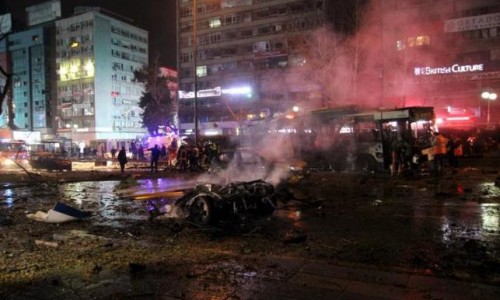
The international arena can be more complicated than most people may think. In November, 2015 one of the strangest things in international politics happened with Turkey shooting down a Russian warplane en route Syria. This phenomenon is “strange” giving the fact that troubled Syria which borders Turkey in the south portends danger to the country’s territory. The Russians and Turks are known to have kept “friendly” relations in time past. It is the first time a Russian aircraft has crashed in Syria since Moscow launched air strikes against opponents of President Bashar al-Assad earlier in September.
The Recep Tayyip Erdoğan’s regime in Ankara (the Turkish capital) appears to be struggling with domestic challenges already; a battle with “mighty” Russia and a strong ally may look to like a poor calculation in times like this. But President Erdoğan is a smart politician who knows how to distract his people from their present economic challenges!
Was the President looking for favour with the West by bombing down the Russian plane? I say this because, the US has long considered Turkey a major ally in the region, and its Incirlik air base in the southeast part of the country is essential to US-led NATO missions in Syria and Iraq. The site also houses US nuclear tactical weapons. Then what is the sense of Erdoğan’s actions against Russians.
With the Russians sure to reciprocate the Turkish gesture not after insulting President Putin’s large ego, the economic effect of a trade embargo will soon bite harder. This is because Russia is Turkey’s second trading partner after Germany. The former Soviet Republic is the main import source for the Turkish economy. Imports from Russia account for about 13% of overall imports. Whereas Russian tourists visiting Turkey as of 1999 was below 500 thousand, this figure reached 2.4 billion in 2007. Turkey has become the most preferred holiday destination for Russians. The number of Turkish tourists visiting Russia is also rapidly growing and reached about 200 thousand. This places Turkey in a precarious position should Moscow strike.
On Friday July 15, 2016 the world received the shocking news of a failed coup attempt in Turkey. That came few days after the Islamic State claimed responsibility for attacks on Istanbul Airport. Not this again!
On receiving the news, a friend of mine, who is a well-known pro-Biafra (a group calling for separation of former Eastern Region away from Nigeria) campaigner called to buy me a drink. I queried the reason for that knowing that my friend, Ikechi, is not known to be that generous to buy me a drink just for the fun of it. He told me how happy he was on hearing of that the “patriotic Turkish army” took over from “dictator Erdoğan”. He is happy that such event will propel some “patriotic soldiers to save us from Buhari’s dictatorship.” He dropped the call after I told him I was so tired that night.
In parenthesis, Ikechi went into jubilation when the result of the recent British referendum went in favour of the “Leave” campaigners under the nickname Brexit. He told me that will be enough justification for Biafra to leave Nigeria. I politely informed him that both phenomena are not the same. I told him how Morocco left the African Union (then known as OAU) in 1984 without any consequences. I told him that Morocca’s exit from the AU is what can be compared to Britain leaving the European Union (EU). Whether he agrees with me, is another issue altogether.
The Turkish “coup” is one of the strangest in recent history. Though there are obvious justifications for at least a change of government in Ankara, every box of “how not to plan a coup” was ticked in the Turkish coup. The disenchantments of the people against the government were not properly articulated into a political action. The coup looked likely to fail, even with the coup plotters’ military strength, or their support inside the military. They failed to make it seem like they were going to succeed. The ability to shape perceptions of success, often through media, is crucial in coups. People tend to support a coup if they think it is going to succeed.
This was the missing link in Friday’s coup in Turkey!
There are striking similarities between Turkey and Nigeria. Both countries have past experiences of military rule. While Turkey can boast of nationalist soldiers like Mustafa Kemal Atatürk who will shun all tribal sentiments and institute strong economic reforms; Nigeria has had to battle with corrupt and power-hungry generals whose only mandate is gratifying their inordinate desires. To buttress this point, there have been several rumours of a possible military coup in Nigeria in recent time. From the sections these are coming, one can see the “patriotism” in those hailing the imaginary coup. Perhaps the media and the opposition need to learn how to and how not to play politics in Nigeria using Turkey example because military coups are no longer fashionable, as the Turkish recent experience clearly show.
ENDOlalekan Waheed ADIGUN is a political risk analyst and independent political strategist for wide range of individuals, organisations and campaigns. He is based in Lagos, Nigeria. His write-ups can be viewed on his website http://olalekanadigun.com/ Tel: +2348136502040, +2347081901080
Email: olalekan@olalekanadigun.com, adgorwell@gmail.com
Follow me on Twitter @adgorwell


Be the first to comment